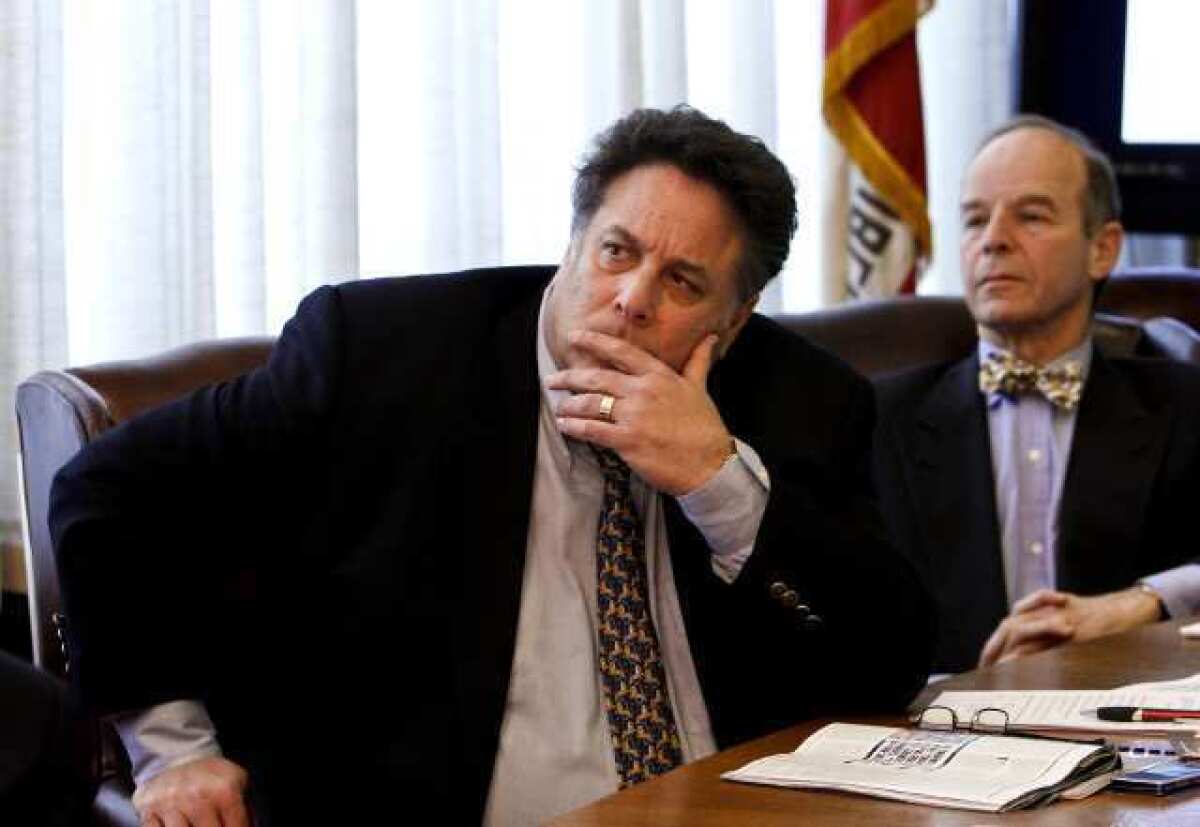Rave support shrinks in light of Coliseum official’s alleged conflict of interest

- Share via
The head of the Los Angeles Memorial Coliseum Commission on Wednesday withdrew his support for bringing a giant rave back to the stadium after The Times disclosed that an administrator for the agency worked at the same time for the producer of the trouble-plagued event.
Commission President David Israel’s pledge to oppose a return of the Electric Daisy Carnival came as two investigations were launched into Todd DeStefano’s simultaneous employment by the Coliseum and the producer, Insomniac Inc.
“The integrity of the Coliseum is not for sale by any commissioner or any member of the staff,” said Israel, who had previously backed Insomniac’s events.
The company has been staging raves at the stadium and the neighboring Los Angeles Memorial Sports Arena, which the commission also runs, since 1998. Electric Daisy is a major revenue source for the Coliseum.
The DeStefano controversy also prompted Commissioner Rick Caruso to call Wednesday for the resignation of Commission General Manager Patrick Lynch. In addition, it spilled into the race between Los Angeles City Councilman Bernard Parks, who is a rave proponent, and his challenger on the March ballot.
The commission’s longtime assistant general manager for events, DeStefano went to work for Insomniac about two months before last June’s Electric Daisy, which was marred by numerous drug overdoses and the death of a 15-year-old girl.
DeStefano played a key role for the commission in arranging for security and emergency services at Electric Daisy. Lynch gave him permission to work at the same time for Insomniac.
The Los Angeles County district attorney’s office and state Fair Political Practices Commission on Wednesday announced separate investigations into the circumstances surrounding DeStefano’s double employment.
“The Coliseum Commission was lied to by our staff about how the security for the raves was planned,” said Caruso, a prominent developer. “We have now learned the fox was guarding the henhouse, since the staffer in charge of planning security was also secretly working for the rave organizer.”
DeStefano, Lynch and Insomniac representatives did not return telephone calls seeking comment Wednesday. In earlier interviews, DeStefano and Lynch said they did nothing wrong.
Parks, whose council district includes the Coliseum, accused Caruso of “showboating” and said the panel should treat Lynch’s involvement in the DeStefano-Insomniac relationship as a private personnel matter.
Parks also restated his backing of raves as an economic boost for his district, saying the Electric Daisy Carnival delivers 4,000 jobs and $33 million in revenue for the city.
But his opponent in the upcoming 8th District council election, Forescee Hogan-Rowles, said any future raves should be canceled until promoters can ensure that illegal drugs would be kept out of the Coliseum. She also said Parks should return a $500 campaign contribution from DeStefano and a $250 donation from Pasquale Rotella, the founder of Insomniac.
DeStefano also donated $1,500 to Parks’ campaign for county supervisor in 2008.
Lynch has donated widely to Coliseum commissioners. From 1999 to 2001, he gave $1,450 to Supervisor Mark Ridley-Thomas, who was then a city councilman. He contributed $950 to Parks between 2002 and 2007.
Last year’s Electric Daisy was the largest rave ever held at the Coliseum, drawing 185,000 people over two days. About 120 attendees were taken to the hospital, mostly for drug intoxication. One of them, Sasha Rodriguez, died two days later of an Ecstasy overdose.
Afterward, Los Angeles Police Department officials said there should have been more security at the event. LAPD Deputy Chief Pat Gannon told The Times this week that he frequently clashed with DeStefano over safety issues.
Security preparations were important to Insomniac because the company paid many of the costs. DeStefano and Lynch have denied that Insomniac’s finances had anything to do with the commission staff’s security standards.
In a Times interview last week, DeStefano said he went to work for Insomniac last April and was paid through one of three companies that he has launched from his home since 2006. He declined to reveal the amount.
Lynch said he reduced DeStefano’s commission pay last year — he earned about $172,000 in 2009 — because of his work for Insomniac, but DeStefano continued to represent the Coliseum in planning for Electric Daisy.
In January, Lynch informed Israel of DeStefano’s employment by Insomniac. Israel said he directed Lynch to give DeStefano the choice of quitting the commission or severing his ties with the company. DeStefano resigned to become a full-time events promoter, including for Insomniac.
Jane Robison, a spokeswoman for the district attorney’s office, said its Public Integrity Division would look into whether DeStefano’s employment was a criminal conflict of interest.
Roman Porter, executive director of the Fair Political Practices Commission, said his agency would investigate whether DeStefano violated laws by failing to disclose income from an outside source and engaging in a conflict of interest.
Porter said the inquiry would also determine whether DeStefano violated “revolving door” statutes that require government employees to wait at least one year after leaving their jobs before lobbying their former agencies.
The FPPC imposes administrative penalties, but could refer evidence of criminal violations to state or local prosecutors.
The Times reported Wednesday that DeStefano had never filed financial disclosures required by the state for someone in his position.
DeStefano said he was not asked to file them, but commission records reviewed by The Times showed that he was notified of the requirement in 2008 and 2009.
Times staff writer Maeve Reston contributed to this report.
More to Read
Sign up for Essential California
The most important California stories and recommendations in your inbox every morning.
You may occasionally receive promotional content from the Los Angeles Times.















